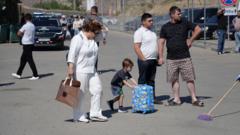Tensions remain high as both Iran and Israel engage in a back-and-forth of military actions and accusations, complicating prospects for negotiations.
**Iran Demands Halt to Aggression Before Reinstating Diplomatic Talks**

**Iran Demands Halt to Aggression Before Reinstating Diplomatic Talks**
Iran's Foreign Minister asserts that diplomatic discussions will only resume if aggression towards Iran ceases amid ongoing hostility.
Iranian Foreign Minister Abbas Araghchi issued a firm statement on Friday regarding the state's position on diplomacy in light of heightened military tensions with Israel. During a meeting in Geneva with European diplomats, Araghchi emphasized that Iran would not engage in further discussions about its nuclear program until Israel's military aggressions were halted.
This diplomatic stalemate occurred shortly after Israel's Defense Minister signaled a "prolonged" conflict was on the horizon, as missile exchanges continued, with Iran firing at northern Israel while Israel targeted strategic sites across Iran. Araghchi reiterated that Iran's nuclear ambitions were peaceful and accused Israel of conducting attacks in violation of international law.
Iran's stance aligns with its commitment to national defense, which Araghchi characterized as non-negotiable. Contrastingly, Israel's ambassador to the UN labeled Iran with a "genocidal agenda," vowing to keep targeting Iranian nuclear infrastructure until it was completely dismantled.
In a parallel development, US President Donald Trump made headlines by indicating that Iran faced potential air strikes within a two-week timeframe unless diplomatic overtures were made. He remained skeptical about the efficacy of European mediation, asserting that discussions between Iran and Europe were unproductive.
UK Foreign Secretary David Lammy noted the precarious situation in the Middle East heightened by the US's ultimatum. Meanwhile, French Foreign Minister Jean-Noel Barrot urged Iran to enter negotiations without awaiting a complete cessation of military strikes, stressing that military intervention would not conclusively address the nuclear challenge.
Amid the ongoing exchanges, Israel continued its military operations, reporting missile attacks targeting Haifa and inflicting casualties within Iranian territory. Reports on the Iranian human toll from the conflict reveal at least 224 fatalities, with human rights groups indicating the unofficial count could reach 639.
As hostilities escalate, the prospects for successful dialogue decrease, marking a critical juncture in the Iranian-Israeli relationship. Young Iranians find themselves grappling with the conflict, indicating a division in opinion on regime support amidst the unfolding crisis.





















